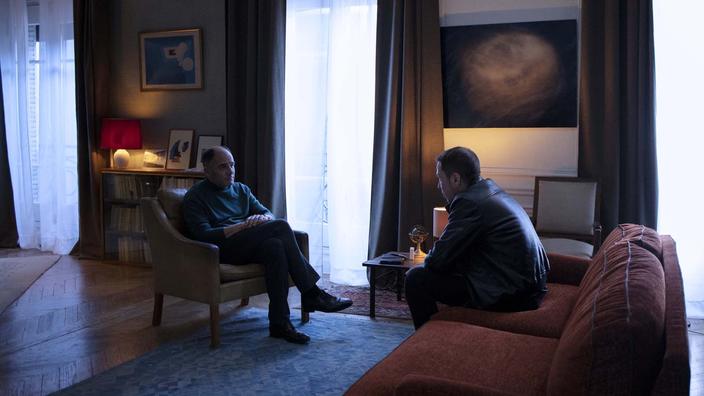In France, the day after the attacks of November 13, 2015, a surgeon, a BRI police officer, a disturbed teenager and an unbearable couple, all in the midst of an existential crisis, follow one another on the couch of a therapist.
Nothing very encouraging a priori.
As soon as it was released online on the Arte website on January 28, this remake of an Israeli series (
Betipul
) was nevertheless a great success.
Maybe because the cast of
In Therapy
is excellent: Frédéric Pierrot (the shrink), Mélanie Thierry, Reda Kateb, Clémence Poésy, Pio Marmaï (his patients)….
Faces that we no longer present but that we enjoy finding in such intimate roles.
A cast completed by the breathtaking Céleste Brunnquell (Camille in the series), confirming here the talent she revealed a few months ago in
Les Éblouis,
also comes to heal her ailments at the shrink.
Read also:
In Therapy
, the series that puts the world on the couch
Perhaps also the series by Olivier Nakache and Éric Toledano (
Le Sens de la Fête
) is also timely.
As a global pandemic stretches and spreads, the issue of mental health is becoming a political and media issue.
Proof of this is: among the measures taken by the government to fight against the distress of students, a "psy check" to consult without advancing any costs.
And watching on our small screens
In Therapy
is almost like crossing the threshold of a shrink's office, despite all the resistance that exists in real life.
Resistance that the series could help reduce, according to some practitioners.
Alison Novais, clinical psychologist in nursing home, embarked on the screening cautiously.
"Another white man, in his fifties, in the beautiful Parisian districts ...",
she thought at first.
Before returning his jacket after a few episodes:
"He's a modern-day shrink, he intervenes, he plays the game. And above all, he has flaws, we don't see him only in the position of knowing."
At the heart of French society
If Véronique Barfety, clinical psychologist and consultant in psychology of movie characters, regrets
"some hiccups, such as the fact that the therapist recounts memories of her own childhood"
, she testifies to the same enthusiasm as her colleague.
Marie-Claude Defontaine-Catteau, clinical psychologist specializing in the treatment of pain is also tempering, while preparing to watch the entire season a second time.
“Fiction necessarily condenses.
The patients advance in their therapy at a supersonic speed: the work which they accomplish in two sessions corresponds to what one obtains in one year of analysis ”,
she admits.
This does not prevent him from having recognized with amusement some of his patients.
And she is full of praise for the script qualities.
En Therapy
is not only a succession of individual tragedies, it is French society and its pains that are reflected there.
“The three central themes are also those which lead our patients to consult: love, death, and trauma,”
explains Marie-Claude Defontaine-Catteau.
With a temporal dimension as recalled by Alison Novais:
"If the events are not comparable, the post-terrorist period and the pandemic that we are going through have in common to question our foundations, our links and our habits, to generate a trauma throughout society. ”
So for her, in addition to being relatively faithful to the realities of therapy, the series has many advantages.
“The daughter of one of my nursing home patients told me that she imagined better what I was doing with her mother.
I think this kind of series demystifies the practice, and that's good. ”
And the psychologist to add:
"Dr. Dayan (Frédéric Pierrot, Editor's note) does not make a diagnosis to his patients, he speaks vaguely of post-traumatic syndrome, but does not stick labels, does not pathologize any of those who come. in his cabinet.
This can help defuse the concerns that prevent some people from passing the course. ”
But not all of them.
Conversely, Marie-Claude Defontaine-Catteau testifies to an analysand who
“was angry by the series, found herself in a defensive position, as if her intimate friend were on the screen… but if the series disturbs, it is because it is fair ”
.
Whether it pleases or bruises souls still too sensitive, we all recognize a little in the characters of
In Therapy
.
And this goes even for shrinks.
Cinema, theater, music ... The student journalists of
IPJ, the Practical Institute of Journalism of the University of Paris Dauphine
, offer their perspective on cultural news.
IPJ Dauphine

